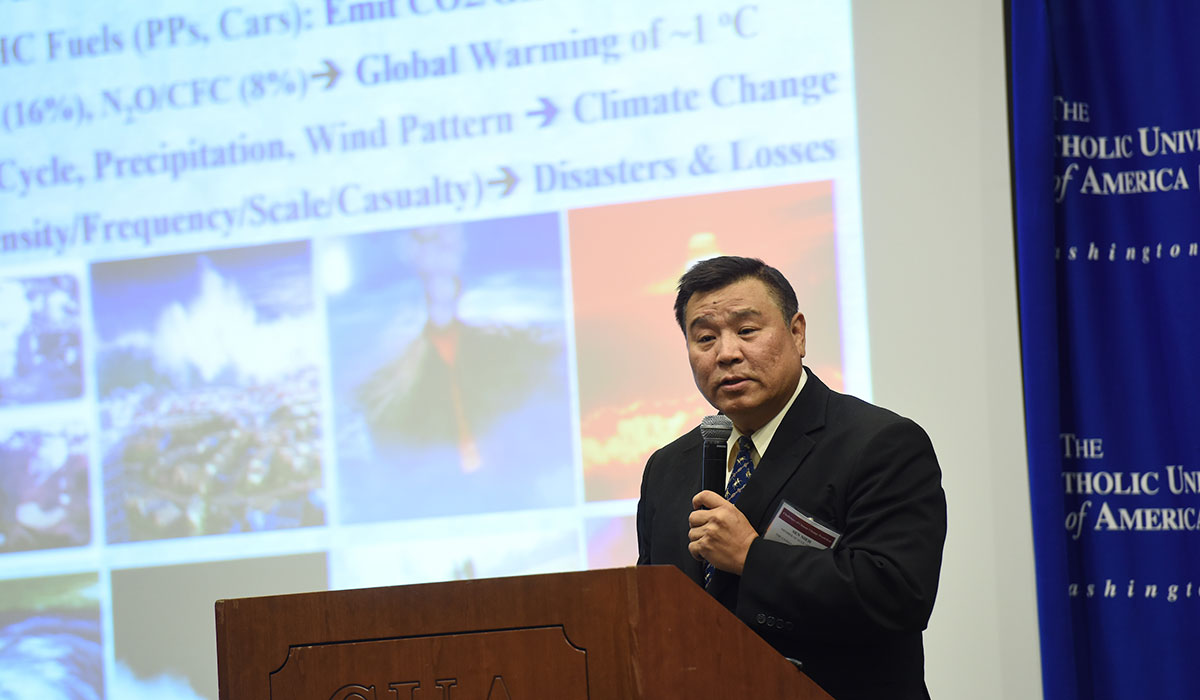

International experts who participated in a workshop last week at Catholic University sent a clear message: Climate change is confronting our planet and its inhabitants with enormous challenges; only by joining together can we expect to resolve them.
“We are all part of the problem; we all have to be part of the solution,” said Ezio Mattiace, one of the experts who gathered for the Nov. 16 “Challenges of Climate Change” workshop, sponsored by the School of Engineering.
Mattiace, a specialist in renewable energy representing the Climate Reality Project, began his presentation by showing a slide of the iconic photograph from space of Earth as the “blue marble.” That image, captured in 1972 by the crew of NASA’s Apollo 17 spacecraft, has been credited with helping to foster a new environmental awareness.
The workshop, held in the Edward J. Pryzbyla University Center, was the first event marking the engineering school’s commitment to establish an Engineering Center for the Care of the Earth, intended to foster greater understanding of the effects, both positive and negative, that technology has on our planet and on our relationships with one another.
“The School of Engineering has a long history of research and education in areas that relate to the environment,” said John Judge, the school’s dean, in his opening remarks. “But after Pope Francis published his encyclical Laudato Si’ in the summer of 2015, it was apparent that we needed a more organized response to the challenge of protecting our common home.”
“We are proud of our commitment to environmental stewardship at Catholic University,” President John Garvey told workshop attendees in his welcoming remarks, concluding, “Climate change disproportionately affects the poor, which makes addressing it a matter of social justice.”
Several speakers pointed out that climate and weather are two different things, as are global warming (cause) and climate change (effect). In the words of Ross Salawitch, a professor in the departments of atmospheric and oceanic science, chemistry, and biochemistry at the University of Maryland, College Park, who spoke on the importance of the Paris Climate Agreement, “climate is the average of weather.”
“Global warming causes climate change, and climate change causes natural disasters,” said Sen Nieh, professor and chair of the University’s mechanical engineering department. Nieh presented data showing that over the past half-century, there has been a clear and troubling increase in disasters such as wildfires, hurricanes, tornados, and tsunamis, causing massive loss of life and property and increasing the number of climate refugees uprooted from their homes.
Among many other participating speakers were Giovanni Cecconi, founder of the Venice Resilience Lab, who highlighted how the city of Venice is responding to rising sea levels; Compton Tucker, a senior scientist with NASA’s Goddard Space Flight Center, who shared his expertise on satellite observations of weather and climate; and Mark Z. Jacobson, professor of civil and environmental engineering at Stanford University, who spoke on the necessity of conversion from our dwindling supply of fossil fuels to renewable energy sources such as wind, water, and solar power.
A recently published article in the journal BioScience, signed by more than 15,000 scientists from 184 countries, warns that not enough is being done to address the climate crisis. Nonetheless, some workshop speakers suggested that there is cause for optimism. Polls show that significant international majorities favor the conversion to renewable energy. Market forces are making alternative energies less expensive. And renewable energy creates jobs. State and city governments across the U.S. are showing leadership in the area of climate change.
“There’s a lot to be hopeful about,” said Davin Hutchins, a global campaign strategist with Greenpeace and a senior volunteer with the Climate Reality Project. “There are a lot of minds being changed.”